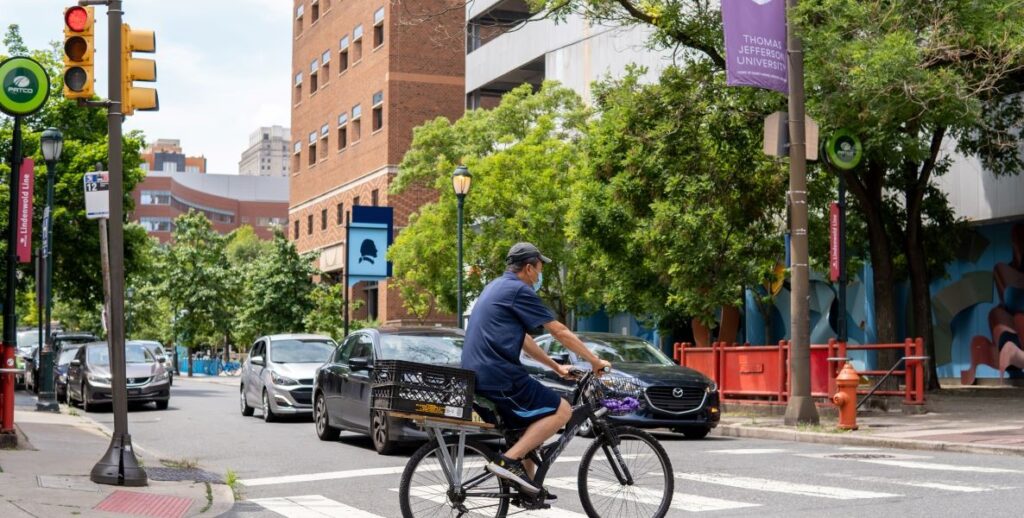Lots of attention has been paid to issues such as crime, schools and taxes during this election season, and rightfully so. But enhancing the quality of the physical environment of the city also needs to be a priority.
Philadelphia has an advantage over most American cities in that it has an urban form that mostly predates the invention of the automobile. Our land use and population density make walking and cycling a viable way to get to places. That, plus our extensive public transit network, has made Philadelphia easier than some other places to live without a car. Census data shows that well over a third of our residents do not own cars. Almost 30 percent of occupied housing units have no cars.
Yet, it appears that the city is becoming overwhelmed with cars and more and more people are opting for car ownership.
Issues of equity also come into play as so many of our poorest residents who don’t own cars have been put at a disadvantage in accessing jobs. In part, this is because of another fact of Philadelphia life: Before the pandemic, some 40 percent of city residents commuted to the suburbs for work, only about a quarter of whom took public transit to get there. At the same time, another 25 percent of Philadelphians got to their jobs via SEPTA — among the highest in the nation. And now, with more people working from home, commuting as we knew it in 2019 looks very different.
That’s why this could be the perfect time for presumptive Mayor-elect Cherelle Parker to create a transportation action manifesto when she takes office in January. Transportation has been in the news a lot lately, between teachers looking for parking places near schools, SEPTA bus route changes, pedestrian deaths from hit-and-run drivers, the controversial Washington Avenue redesign, and the closing of the Greyhound Bus Terminal, to name a few. All these issues suffer from the hodgepodge of bureaucracies that deal with transportation and little political leadership to make transportation issues and improvements a priority.
With all of our transportation assets and the very real need to reduce our carbon footprint due to climate change, could we have the potential to become a mostly car-free city? The key is making not owning a car a more attractive and cost-effective option than owning one. That takes some joined-up thinking and leadership from City Hall.
Transportation issues are in many ways treated as an afterthought by both the Mayor and City Council. The Roosevelt Boulevard Subway extension has been studied to death. Public transit is seen as “SEPTA’s problem,” but the City contributes the majority of the authority’s local funding.
In Boston, Mayor Michelle Wu in her campaign for mayor had an explicit pledge to provide safe, reliable, affordable, and sustainable transportation, as she saw it as the foundation for shared prosperity and health. Her goal since becoming Mayor has been to create environmentally responsible, socially inclusive, and economically competitive walkable urban places. She has reorganized transportation departments and has instituted fare-free travel on certain bus routes. In contrast, here in Philly, none of the candidates in the May primary mentioned transportation in any of their campaigns
Led by the Bicycle Coalition of Greater Philadelphia, a group of 10 organizations published a Better Mobility Platform during the primary season which contains many good recommendations that could be incorporated into such a transportation action manifesto, including motivating one of every two Philadelphians to walk, bike or take public transportation to work. We need better coordination in City government around transportation and a voice at the table regionally and both in Harrisburg and Washington that only comes about when we have a Mayor who makes transportation and mobility a priority.
Some additional actions that the next Mayor can lead on include:
-
- Securing stable funding for SEPTA, perhaps by pushing for a regional transit tax
- A charter change to create a true Department of Transportation with direct access to the Mayor
- Working with Harrisburg to reform the Philadelphia Parking Authority to make it a real partner in tackling the city’s transportation issues, instead of just collecting parking fines.
- Traffic calming and creating low traffic neighborhoods
- Enhanced pedestrian safety at intersections
- More bike parking facilities
- More exclusive bus lanes (for use by cyclists too)
- Better management of on-street parking and of loading zones
- Converting underutilized parking garages into more active uses
- Electric car charging infrastructure
- Championing big projects such at the Roosevelt Blvd subway extension
- Reconnecting neighborhoods divided by highways
- Fare-free travel on certain bus routes
- Revisiting the City’s role in providing transit service vis a vis SEPTA
The next mayor can seize the opportunity to take our strengths as a city with multimodal transport options to the next level, thereby attracting more residents and retaining our existing residents with an enhanced quality of life and an equity of access for all.
Philly has had a reputation for being a place of “used-to-be.” We used to have a manufacturing base, we used to have a larger population, we used to have the Route 23 trolley, etc. Let’s use a new reputation as America’s most car-free city so that we go from being a city of “used to be” to a city where people want to be.
Robert Ravelli is an international consultant in the areas of integrating transport and land use, regeneration around transport stations, mobility management, urban mobility plans, travel demand management, and funding transport improvements. He worked for the City of Philadelphia Mayor’s Office of Transportation during the Rendell administration and is the author of Car-Free in Philadelphia.

